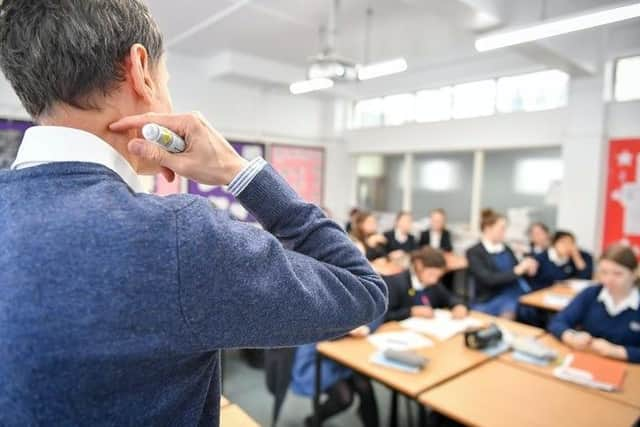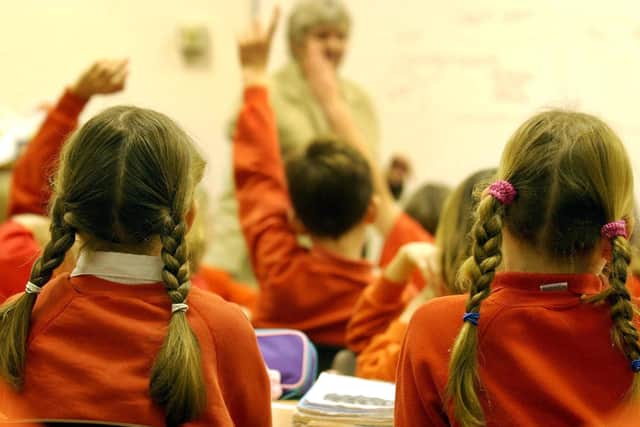Keep schools open to help mental health of students in face of Omicron virus threat – Robert Halfon


Even with the vaccination of millions of teachers, support staff and pupils over aged 12, hundreds of thousands of children are still being sent home to isolate.
According to the Department for Education’s latest figures, 130,000 of all pupils on roll in state-funded schools did not attend school for Covid-19 related reasons.
Advertisement
Hide AdAdvertisement
Hide AdDr Jenny Harries, chief executive of the UK Health Security Agency, confirmed directly to me that, like other forms of Covid, thankfully, children are less at risk from the new variant. Moreover, children are not significant vectors for transmission.


I recently introduced a 10 Minute Rule Bill, backed by the current and former Children’s Commissioners, and by two previous Children’s Ministers, in Parliament which aims to prevent future school closures.
The would introduce a ‘triple lock’ of protections to safeguard against any future school closures, except in cases of extreme emergency.
The Government would have to seek the advice of the Children’s Commissioner on the necessity of closing schools, hold a debate and vote in Parliament to agree the measure, and then seek the further advice of the Children’s Commissioner and a further vote by Parliament every three weeks to place a strict time-limit on any future disruption.
Advertisement
Hide AdAdvertisement
Hide AdMinisters follow the science and advice when it comes to our health, so it is only logical that they do so over schoolchildren.


Statistics published by the Education Policy Institute show that primary aged children were 3.4 and 2.2 months behind in maths and reading. For disadvantaged pupils, this is even greater, with 4.2 months and 2.7 months of lost learning respectively.
In 2019-20, the number of children being referred for mental health treatment soared by 60 per cent. In the same year, there was a 46 per cent rise in child eating disorder referrals.
The question that policy-makers should be asked is: when considering the risks of Covid to children (minimal, thank goodness), do they also consider the perhaps bigger risk of creating a secondary mental health epidemic, and damage to children’s life chances and educational attainment?
Advertisement
Hide AdAdvertisement
Hide AdThere are three measures the DfE should take to combat these rising mental health challenges.
First, every child must receive a mental health assessment. This is important to understand the full scale of the problem.
Second, Ministers should rocket-boost the proposal in the recent Young People’s Mental Health Green Paper to place a designated senior mental health lead in every school by 2025.
The What Works Centre for Wellbeing has identified that good mental health and wellbeing at age 14-15 years has a significant and positive association with educational attainment at age 18. Furthermore, DfE research shows that pupils with better emotional wellbeing at age seven were more than one term ahead of pupils with poorer emotional wellbeing.
Advertisement
Hide AdAdvertisement
Hide AdThird, we know that social media is like a wrecking ball for young people’s mental health. According to NHS Digital, 16.7 per cent of children aged 11-16 said the numbers of ‘likes’, ‘comments’, or ‘shares’ they received had a significant impact on their mood. The Royal Society for Public Health found that one in six young people will experience an anxiety disorder at some point in their life and that four of the five most used social media platforms make their feelings of anxiety worse.
Tellingly, a USA Congressional hearing on social media showed that Facebook knew about the harmful mental health effects that Instagram was having on young girls.
The Treasury should introduce a mental health levy for social media giants. Ofcom published a report which stated the revenue for social media companies is £4.8bn. Introducing a two per cent levy could create a funding pot of around £100m.
This could then be distributed to schools to provide mental health support and digital skills training for young people to build the resilience and online safety skills they need.
Advertisement
Hide AdAdvertisement
Hide AdGiven this, ensuring that schools are not a revolving door of openings and closures for children is the best way to support young people’s mental health and improve their educational attainment and life chances.
Robert Halfon is a Tory MP and chair of Parliament’s Education Select Committee.
Support The Yorkshire Post and become a subscriber today. Your subscription will help us to continue to bring quality news to the people of Yorkshire. In return, you’ll see fewer ads on site, get free access to our app, receive exclusive members-only offers and access to all premium content and columns. Click here to subscribe.
Comment Guidelines
National World encourages reader discussion on our stories. User feedback, insights and back-and-forth exchanges add a rich layer of context to reporting. Please review our Community Guidelines before commenting.